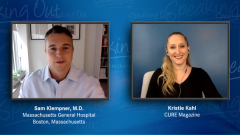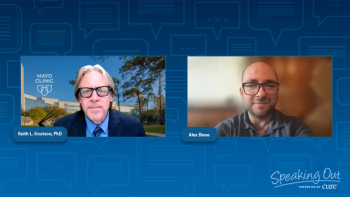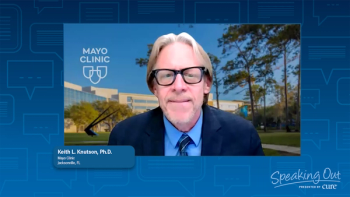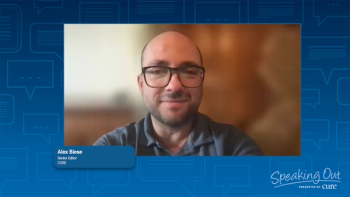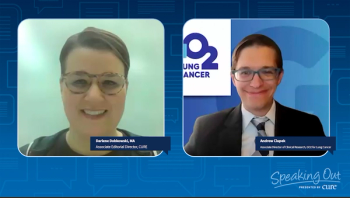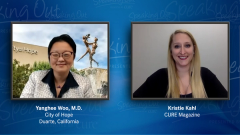
Gastric Cancer in Young Adults
City of Hope’s Yanghee Woo, M.D., highlights risk factors for gastric cancer and comments on the rise in cases in adults 40 years of age and younger.
Kristie Kahl: Hi, my name is Kristie Kahl. [I’m] Vice President of Content at MJH Life Sciences, the parent company of CURE magazine. In this edition of the Speaking Out video series, on behalf of Hope for Stomach Cancer, we're speaking with Dr. Yanghee Woo from City of Hope about gastric cancer in young adults. Hi, and welcome.
Yanghee Woo, M.D.: Hi, Kristie. I’d like to thank your magazine and Hope for Stomach Cancer for hosting me on this CURESpeaking Out video series on stomach cancer, AKA gastric cancer. It's my pleasure to talk with you about this very important topic. It's very dear to my heart.
Kristie Kahl: Great; thank you so much. So, to start, can you explain the rise in gastric cancer in young adults?
Yanghee Woo, M.D.: Sure. The reason for this rise in the incidence of gastric cancer in young adults actually remains unexplained because there are [only] a few studies that have investigated gastric cancer in the young adults age group under the age of 40. There is very little known about why there is currently a rise in gastric cancer in this group, but efforts are being made to address this alarming observation. This trend is especially concerning because it goes against the decreasing overall numbers of gastric cancer cases in the United States and worldwide. For the past several decades, there had been a very steady decrease in the incidents of gastric cancer around the world and in the US. However, the rate of gastric cancer in the young has gone up, and this is very alarming. As we investigate the reasons for this observation, though, the more urgent issue is to be aware of the risk factors that lead to the development of gastric cancer and what we can do about it in the young.
Kristie Kahl: What are the causes or risk factors of gastric cancer in young adults, and what are the differences in causes when it comes to a young adult versus an older adult?
Yanghee Woo, M.D.: Like other cancers, we can categorize gastric cancer risk factors into two groups: the modifiable risk factors, [which are] mostly environmental, the things that we can change; and the unmodifiable risk factors, factors that we are mostly born with and either we cannot change them or they’re not that easily changeable. Young gastric cancer patients are more likely to possess a lot of the unmodifiable features with the additional exposure to the modifiable risks. But because under the age of 40 you have not been exposed to the environmental risk factors as much as the older population, it is most likely the unmodifiable risk factors that are dominant. For example, the average age of gastric cancer [patients] in the United States is 68. They have had a lot of exposure to the environmental risk factors. So, what are the non-modifiable inherited risk factors that put somebody at an increased risk? Ethnicity, [specifically] ethnicity that is not Hispanic white. So, if you're Hispanic, if you're Asian, or if you're a black American, you are at an increased risk of having gastric cancer at a younger age. If you have a family history like your brothers, sister, mother, grandmother, grandfather, anyone in your family, and then if you have more than one [family member], then you are at a higher risk than your friends who do not have family members who developed gastric cancer. If you are male, you are more likely – whether you're young or old – to have gastric cancer. Then there are specific genetic risks. The most common and well-known one is a mutation in the CDH1 germline, your genes. Those genes that create these proteins in the stomach do not exist. These patients who do not have this complete gene mutation end up developing hereditary diffuse gastric cancer, [which] usually runs in families. What is bad is that by the time that you're age 20, if you do not have your stomach removed, you end up dying from gastric cancer. What is interesting is now that we're discovering these variant mutations in these genes [that are] not so severe, but that lead to gastric cancer by the end of [your] 30s, 40s, and 50s, even. So, these are some of the non-modifiable risk factors. But the modifiable risk factors that we can treat – for example, if we identify an H. pylori infection in a young adult, we can treat that. Treatment of H. pylori infection decreases your risk of gastric cancer. If you eat a [lot of] high-salt and smoked foods, like a lot of Korean people, there actually is a higher risk of gastric cancer, even at a younger age. So, you can modify these diets and treat Helicobacter pylori. Obesity is associated with proximately located tumors, and weight loss can help with decreasing risk of gastric cancer. Although not proven, it is hypothesized that is the case. These identifiable risk factors are also associated with socioeconomic status. Low socioeconomic status is associated with increased risk of gastric cancer, perhaps because there is a lack of access to fresh fruits and vegetables, and there are more preserved foods in their diet. Because there are significant negative outcomes associated with young adults with gastric cancer, the urgent first steps that we must take to prevent that are first to recognize these risk factors do exist, what they are, and how they make you at risk for gastric cancer, and then being able to identify these patients at risk for gastric cancer.
Kristie Kahl: What is the difference between gastric cancer in a young adult versus an older adult?
Yanghee Woo, M.D.: The average age of gastric cancer in the United States, like I stated before, is about 68 years old. So, there are significant differences between patients who are older with gastric cancer and patients who are under the age of 40. We recently published a study that we performed in the California Cancer Registry, which is a registry of cancer patients in the state of California. We analyzed the difference, and we found that compared to older patients, young patients under 40 are more likely to be Hispanic [and] more likely to possess aggressive tumors that have poorly differentiated histology. They're higher grade, meaning they're more aggressive. These younger patients are more likely to present with metastatic stage 4 disease with the primary tumor in the stomach, but that has already spread to the peritoneum, which is much more difficult to treat.
Kristie Kahl: What is the prognosis in young adults compared to older adults?
Yanghee Woo, M.D.: There's some good news and some bad news. The good news is that for each stage of diagnosis, meaning the extent of disease progression of gastric cancer at the time of diagnosis, there is no difference in outcome per stage, whether you are young and old. It’s just that more younger patients are being diagnosed in the more advanced stages, giving them the overall worst prognosis. But what's good news is that if you are found at a young age with a very early cancer, stage 1 cancer, you actually do better. Your prognosis is better than the older patient population, probably because stage 1 cancer is completely curable, and you are healthier as a younger person and can tolerate the treatments better. In general, after being diagnosed with gastric cancer, age is not an independent predictor of gastric cancer survival, meaning other factors have stronger impact on patient outcome, regardless of your age. For example, the stage at the time of diagnosis, how you respond to the therapy, how good your surgery is, how responsive your tumor is to the chemotherapy, and possibly other immunotherapeutic agents that are new to the treatment of gastric cancer. Your response to those will predict your overall outcome, not necessarily your age.
Kristie Kahl: Why is it important for young adults to understand this rise?
Yanghee Woo, M.D.: Well, I think it's important to understand the rise of gastric cancer in the young because awareness is actually the first step to prevention and early diagnosis in these patients. We need to recognize that there are young adults at risk for gastric cancer and know the risk factors so we can address this cancer in the young and prevent cancer. It is very difficult to diagnose gastric cancer in an early stage without having suspecting gastric cancer when the patients come with these symptoms. Early stages of gastric cancer are completely asymptomatic. 80% of patients with gastric cancer don't have symptoms initially. At the time of these alarming symptoms of weight loss, inability to eat, the belly getting big, pain, and nausea, these symptoms have gone on for a fairly long time. And at that time, it's a more advanced stage of disease. So, the data is clear that we either do not suspect this when patients who are young present with symptoms associated with gastric cancer, or we dismiss it or treat it a different way. We need to be on high alert in recognizing these symptoms, as well as risk factors in the young patient population.
Kristie Kahl: What would you say is your biggest piece of advice for those young adults diagnosed with gastric cancer?
Yanghee Woo, M.D.: I’d like them to know that [they] are not alone. There is a community of other young gastric cancer patients and their loved ones who are fighting against gastric cancer with them. Know that gastric cancer is preventable, curable, and treatable, especially if diagnosed in early stages of development. So, don't ignore your symptoms. There are less invasive approaches to curative surgery, like I perform with robotic platforms, which are available to you. Now we have more effective therapies. If you are diagnosed with gastric cancer at a young age, it's really important to find the best team of gastric cancer experts that you can trust to guide you through the treatment, because it can be daunting and it can be very scary process, but if you have a team to help you along, then that would be great. We have a multidisciplinary team at City of Hope that specifically addresses gastric cancer, and I actually see quite a few young adults with gastric cancer presenting to us.
Kristie Kahl: Great; thank you so much.
Yanghee Woo, M.D.: Thank you, Kristie.
Transcript edited for clarity.

